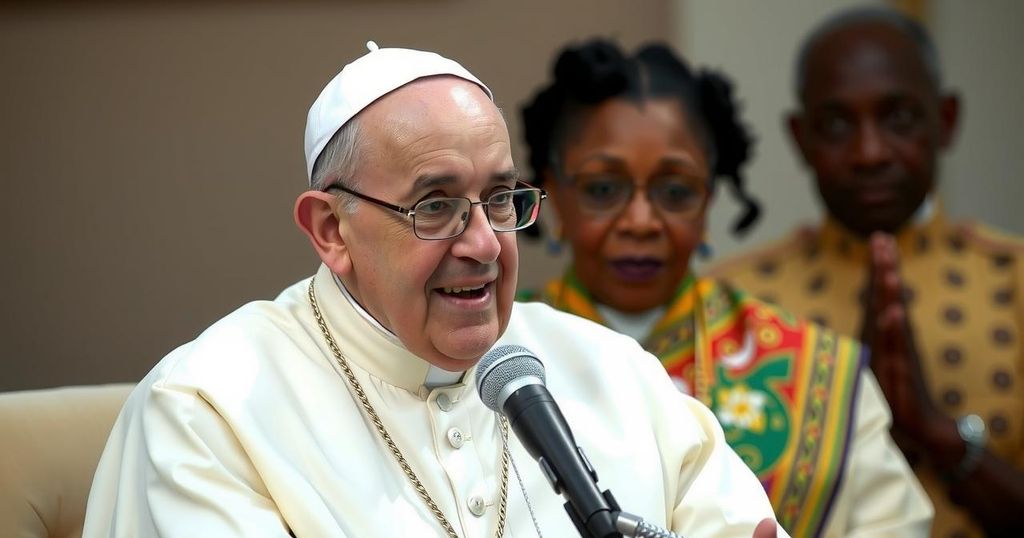Pope Francis Advocates for Equitable Resource Distribution in Papua New Guinea

Pope Francis visited Papua New Guinea, urging that the natural resources should benefit all citizens, not just a select few. He highlighted the imbalance between resource wealth and widespread poverty, appealing for local interests to take precedence in economic decisions. The Pope also called for an end to tribal violence that plagues communities, stressing the need for peace to promote development.
During his recent visit to Papua New Guinea, Pope Francis emphasized that the country’s abundant natural resources should serve the entire population and not just a privileged few. The pontiff addressed leaders and citizens alike, asserting that while substantial revenues are generated through the extraction of minerals and hydrocarbons, it is crucial that such wealth contributes to the betterment of every citizen in this nation of 12 million, where poverty remains dire despite its resource wealth. He stated, “These goods are destined by God for the entire community.”
Pope Francis highlighted an alarming reality; despite the profits derived from projects led by multinational corporations, local populations have reaped minimal benefits. Current statistics reveal that a significant portion of the populace lives in extreme poverty, with access to basic services such as electricity being severely limited. The Pope urged that the needs of local communities must be prioritized in the distribution of revenues generated from these resources, saying it is only equitable that the livelihoods of residents are considered as decisions are made about employment and funding.
This message resonated deeply with the attendees, particularly with young people like Jonathan Kais, who expressed hope that the Pope’s words will prompt better governance and services. The pontiff’s visit took place amidst ongoing concerns regarding tribal violence, which has had devastating impacts on communities and hindered development. In a relief to concerns regarding violence, he appealed for an end to such conflicts, recognizing their destructive nature and their role in preventing peace and progress in the region.
Despite the profit potential from its natural resources, historical context reveals that Papua New Guinea has been unable to translate extraction wealth into improved living conditions for the majority. For example, a World Bank study found that while the economy grew significantly during the resource boom between 2009 and 2018, poverty levels remained largely unchanged, indicating a disconnection between economic growth and the welfare of the populace. The continuing cycle of violence has compounded the challenges faced by citizens, with many families displaced and communities devastated. The Pope’s message serves as both an urgent appeal for equitable resource management and a call to action against violence, aiming for a brighter collective future.
Pope Francis’s visit to Papua New Guinea is significant not only due to its religious implications but also because it highlights the social and economic issues faced by the nation. Papua New Guinea is remarkably rich in natural resources, including gold, copper, and liquefied natural gas, yet it is simultaneously one of the poorest nations within the Pacific region. The disparity between income from natural resource exploitation and the lived experiences of the citizens underscores a long-standing issue of wealth distribution. Additionally, the ongoing tribal violence exacerbates these socioeconomic conditions, complicating the governance and stability required for development.
In conclusion, Pope Francis’s visit to Papua New Guinea underscored the pressing need for equitable sharing of the nation’s natural resource wealth with its entire population. His calls for attention to local needs in economic policy and an end to tribal violence shine a light on the significant hurdles that need to be addressed to foster true development and prosperity. The Pope’s compassionate advocacy for justice and peace resonates with the challenges facing not just Papua New Guinea, but many resource-rich nations worldwide.
Original Source: www.voanews.com





